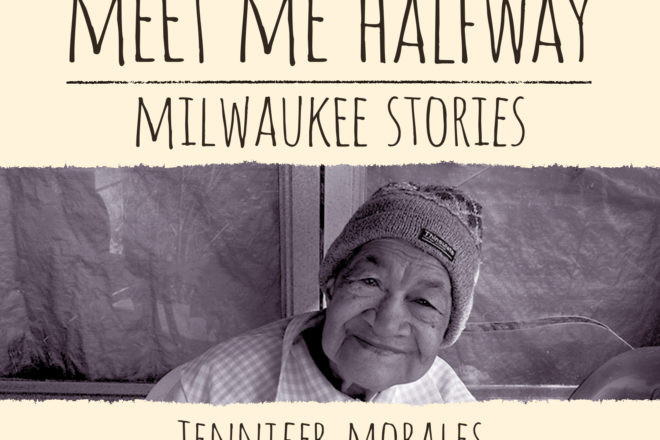Review: ‘Meet Me Halfway: Milwaukee Stories’
- Share
- Tweet
- Pin
- Share

“The children of Milwaukee are the reason I wrote this book,” Jennifer Morales explained. “Their struggles, discoveries and resilience in this difficult place compelled me to try to pin some of Milwaukee’s voices down, to listen and maybe sound out something about how this city came to be the way it is.”
Morales’ collection of interrelated stories Meet Me Halfway will remind readers of Sandra Cisneros’ classic The House on Mango Street. Families black, brown and white interact in this city that I had come to know during the 1970s when my wife and I lived on the East Side of Milwaukee, where our babies were born and attended the busing-integrated Maryland Avenue Public Elementary School. We invited inner-city children to our daughter’s birthday party, and once I dropped her off at an inner-city apartment to attend a classmate’s birthday party. Both were challenging events for me.
In her excellent book Morales shows that the more things change, the more they remain the same. Two of her central characters, a black high school student named Johnquell and his Hispanic friend Taquan, attend Whitefish Bay (aka White Folks Bay) High School as part of the city’s voluntary integration program. The boys are friends by circumstance because they are among a tiny minority of black students within a dominant white population.
Johnquell is gifted, young and black, a senior who is accepted at the University of Wisconsin – Madison. He has been nurtured academically by Mrs. Charles, a black English teacher at the high school, and through her tutelage has become aware of the complexities of inter-racial problems.
The tragedy that befalls Johnquell serves as a catalyst bringing together an array of characters whose interaction demonstrates the “struggles, discoveries, and resilience” not only of disadvantaged children in Milwaukee, but also of adults around them.
A less talented storyteller than Morales could easily respond to societal problems with diatribes or melodrama or sensationalism, but she doesn’t. When Johnquell writes a paper on racism experienced by black soldiers in Vietnam, a white long-term substitute teacher reads it, arguing an alternative view of the situation, from his experience as an MP in Vietnam. Initially the reader condemns the viewpoint of the sub, but later comes to understand his position.
•••
As a determined 1970s liberal I gripped my steering wheel with white knuckles as I drove away from the apartment with booming music, hearing again the voice that had jokingly greeted my knock on the door, “Must be the poe-lease!” as I deposited my second-grade daughter in the sea of black faces. But when I returned at the appointed time to pick her up, I found that this had been a family party, and that my little girl had a wonderful time.
Now at this time in our history when people are struggling with Black Lives Matter, when prisons are disproportionately filled with black convicts, when black gangs seem to flourish in Chicago – Meet Me Halfway is relevant.
While the subject matter is engaging, Morales’ skillful writing adds to the reader’s pleasure. The stories float back and forth in time, but are moored by the reappearance of characters. Despite the poignancy of their lives and the situations they encounter, these are stories of hope.
My family and I moved from the East Side of Milwaukee to Sister Bay in 1981, not white flight from the city but for a job opportunity, and despite the good life we enjoyed in Door County, a part of me continues to miss that town. Now the little girl who went to the inner-city birthday party lives in greater Milwaukee and has presented me with a two-year-old granddaughter. I am confident that Julia will attend a public school and am hopeful that she might have a girlfriend named Tiana and perhaps date a boy named Taquan. And one day maybe she’ll read Meet Me Halfway and laugh as she informs me, “Times have changed, Grandpa.”
A note from writer Gary Jones: While I generally try to keep my personal life out of my reviews I make an exception for Meet Me Halfway. If race relations are to improve in this country, we must all take the problem personally.
Meet Me Halfway: Milwaukee Stories by Jennifer Morales / 192 pages, Terrace Books (University of Wisconsin Press), 2015

